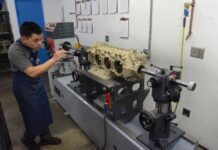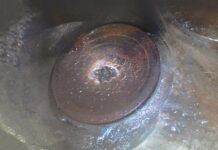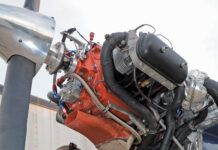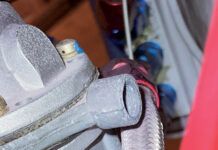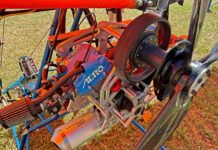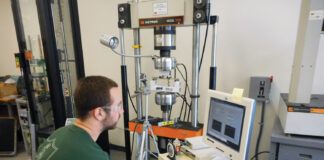
The interior of a hangar comes into focus as an announcer says, “Building Time Theater presents, ‘The Usual Suspect, Part One: The Misfire.’”
It’s late evening and the hangar is quiet. Two men linger in the dim light of an incandescent bulb that hangs over a workbench. One pages through a tattered issue of KITPLANES®. The other draws a labored breath through a cigarette, its glowing tip reflecting on a window blackened by the night. He captures the smoke behind closed lips before coughing out, “Joe, we need to bring Marvel Shebler in and tune ’im up.”
“Why’s that?”
“There was an explosion in an exhaust pipe this morning.”
Joe turns a page of the magazine. “But why Shebler?”
“A guy saw him hanging out in that area.” He tosses his cigarette into a can of dirty water as he pulls another from a shirt pocket embroidered “Cliff.” “Figured him for the trouble.”
Joe looks up from the magazine, his face illuminated by the flame of Cliff’s lighter. “Didn’t we investigate him last month when that engine was missing?”
“Yah.” Cliff flicks the lighter shut and stuffs it in his pocket. “I’ve been suspecting him of causing a lot of trouble around here, but nothing ever sticks. I thought he roughed up that engine a few weeks ago, the one you’re talkin’ about. Turns out a guy everyone calls ‘The Mechanic’ caused that trouble. He beat up a spark plug real bad. Broken insulator.”
“Doesn’t sound right to me.” Joe returns to paging through KITPLANES®. “Marvel Shebler couldn’t do a job like that any more than Stromberg, Bing, Ellison, Posa, Lake, Rotec, AeroInjector, or any other carburetor or throttle body or whatever they’re callin’ themselves. An explosion in an exhaust pipe is too targeted. That’s not their way of doing things. If they’re gonna take an engine out, they’re gonna take the whole thing out—starve it or choke it until they’ve silenced it.”
Cliff stares into the darkness outside the window. Joe turns another page. The scene fades to black before the announcer closes with these cautionary words: “The carburetor is always the first suspect when an engine misbehaves. It’s a tale as old as the internal combustion engine. But wise mechanics know most carburetor problems are electrical. Let that sink in while you count the wires attached to your carburetor.
“Tune in next month when Building Time Theater presents ‘The Usual Suspect, Part 2: The Missing Power.’”
Carburetors hold a mystical power over our collective psyche. Maybe the name is to blame. The word “carburetor” offers no hint of what it does or how it does it, whereas the word “starter” cuts to the heart of that component’s purpose. “Starter” is both a noun and a verb. “Carburetor” is…hard to spell. When an engine misfires, no one points to a starter and says, “Maybe that’s the problem.” Carburetors, however, get blamed for everything:
- Engines that won’t start.
- Engines that run poorly.
- Engines that run on after the ignition has been turned off.
- Engines that won’t develop power.
- Engines that run too hot.
- Lights that have been left on.
- Cats that haven’t been fed.
Despite their complicated name, carburetors are simple machines that only facilitate the mixing of fuel and air into a combustible aerosol. Carburetors are little more than networks of metered air and fuel passages. They lend their throat to the cylinders so each can draw a breath to the best of its ability (which, like Cliff, could be diminished), but they can’t aide the breathing. Carburetors hold no sway over the type, quality, or quantity of fuel that is delivered to their fuel inlet; they can only ingest it and pass it along. Study a cutaway illustration of a carburetor, and you’ll also see that nothing inside can move of its own accord. Everything that moves requires an outside influence: fuel pressure, airflow, the input of a pilot (with the throttle and mixture controls), or the caress of a tool.
Proper combustion is a cooperative effort between all of the systems of an engine, and a carburetor is only one of many systems. Carburetors can’t compensate for a deficiency elsewhere in an engine. They have no way of knowing if the ignition timing is off or a spark plug wire is cracked. Put more simply, carburetors cannot direct or withhold their mixture from specific cylinders nor cause cylinders to ignite when they’re not supposed to. When an engine backfires through the exhaust pipe or coughs into the intake manifold, it’s because ignition has occurred while a valve is open, not because a screw needs to be adjusted on the carburetor. You can “tune” a carburetor for days, but you won’t resolve any of the problems on this (partial) list of engine problems by making carburetor adjustments:
- Damaged spark plug wire(s) or spark plug(s)
- Cracked distributor cap or failed rotor
- Failed magneto
- Valves out of adjustment
- Intake manifold or cylinder head gasket leak
- Bad ground in an electronic ignition system
- Missing primer plug on a new or serviced engine
Carburetors become less mysterious when you understand what they can’t do. When an engine runs poorly, before casting an accusatory glance at the carburetor, remember that it cannot cause individual cylinders to misbehave. When an engine stutters, it’s more likely to be faulty ignition or a cylinder that can’t breath correctly (for a variety of reasons). Keeping that in mind will speed you toward a correct diagnosis and get you back in the air, building time.


